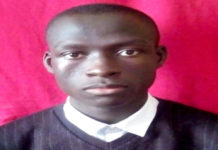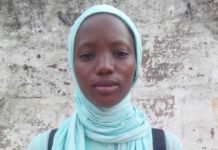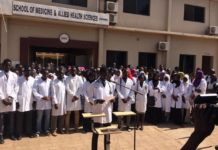With Saikou Suwareh Jabai
You are welcome to yet another edition of your weekly Student’s Voice.
We feature stories, articles, poems, etc, from students and teachersalike. We encourage other students to contribute and get their writing
skills developed. The column is open to all and sundry in the
education milieu in of The Gambia. Sit back, relax and enjoy these
fascinating pieces.
QUOTATION OF THE WEEK
“The harder the battle, the sweeter the victory,” unknown.
BRIGTHEN UP
Hardships are part of life,
But faith and endurance undo any plight.
Our success only lies in what we strive for
To ease our pain and achieve delight
Oh! You who have given up hope in grief,
Brood not on your sorrow day and night,
For certainly your agony shall someday leave
And life again shall be bright.
But this if you must achieve;
You must rise against the challenges you face,
You must have hope and the belief
That success in life comes in many ways.
As long as you live
In this world, this temporal place;
From sources you didn’t perceive,
Your difficulties ease might replace.
Tomorrow, is another day,
So shake off your sorrow and be happy!
Struggle for your life in the right way,
So you shall always be free.
Lift yourself up and do not sway!
To play the game of life is worthy,
For our deeds and actions do shape the way
Of the life we live night and daily.
By Alieu O.Jallow.
DRIVERS OF CLIMATE CHANGE ARE UNFAIR
The injustice about the climate change to me as an African and a
Gambian in particular is that the people who are least responsible for
the unfortunate changes of the climate are the ones who are paying the
most brutal price in its aftermath. Climate change in Africa is
awfully contributing to the creation of more deserts, starvation,
water scarcity and food insecurity. Those responsible for climate
change are unfair. The countries and communities that are most at risk
from its impacts, and are least able to adapt, are those that have
contributed the least to the global problem. If poorer nations pursue
economic growth by the same means from which the rich and
industrialized nations have benefitted, then they will only add to the
climate change problem. Indeed, the richest nations insist that all
nations, including the poorest ones, should act to limit climate
change, but when the poorest nations ask the richer ones for help to
do so, they don’t get the finance and technology they need in return.
Now I ask, is this really fair?
If this is not enough a justification to convince you of my
observation, then let’s look at the international negotiations on
climate change. Some countries hold considerable power while others
have little to bring to the table other than moral arguments. The more
vulnerable nations can do little when industrialized nations fail to
act to limit climate change, or even break promises they have made in
the past. How can the richer nations provide ‘climate finance’ to
poorer nations in the form of loans ‘not’ grants, yet still they are
in effect asking the so-called beneficiaries to pay to fix a problem
the richer nations created.
China and America are the world’s biggest emitters of green house
gases in the atmosphere that profusely result to change in the
climate. Famine in Somalia killed an estimated 260,000 people between
2010 and 2012. It was the direct result of severe drought across the
region. Erratic rainfall and prolonged dry spells have sustained high
food prices across the Sahel region, making it increasingly difficult
for its innocent poor people to feed themselves.
If the assessment report of the Intergovernmental panel on Climate
Change (IPCC) is anything to go by, then by 2020, up to 250 million
Africans are likely to suffer from food insecurity as a result of
climate-driven crop failure, loss of livestock, and inadequate water.
That is not all. The World Bank also indicates that, by 2040, drought
and increased heat could reduce by 40-80 per cent the area of sub-
Saharan Africa suited for growing maize, millet or sorghum. It says a
2°C increase in temperature (projected for 2040), could reduce maize
yields by 5 to 22 per cent, wheat by 10 to 17 per cent, and sorghum by
15 to 17 per cent.
The devastation of extreme climatic conditions can cause in Africa is
evident. However, chanting the injustice status of climate change will
effect little or no measure, or help to solve the equation; and there
is no time to point accusing fingers.
We should understand and accept the fact that other continent’s
actions can crucially impact on our home and as such, we need to be
clear and not to compromise our right to a better future, if not for
ourselves but for the generations yet unborn. We need not to be
bystanders in international negotiations and decision making processes
on climate change as we are highly vulnerable.
Yes, some aspects of our agriculture may benefit from climate change,
but the rising temperatures and extreme events it drives, such as low
rainfall and floods, appear likely to threaten crops and livestock
across in the country. However, it can have less direct effect too, by
affecting the pests, weeds and parasites. Together, these changes have
already been linked to rising food prices and reduced food security.
Even though The Gambia has one of the lowest overall per capita global
warming emissions on the planet, the country is suffering some of the
consequences of climate change. Some of these impacts are already
unfolding and an undeniable example is the unfortunate precipitation
of the rainfall in 2014. If the government of The Gambia wants to
achieve its blueprint, themes of climate change mitigation and
adaptation must appear on the summit of its agenda. Needless to say,
the unfavorable statistical distribution of weather patterns in The
Gambia seriously threatens our food security in both fisheries and
agriculture.
As an African climate change activist, I wish to sum up by calling for
the equitable distribution of resources among nations to tackle
climate change and for climate-vulnerable people to fully take part in
decision making at the international level as climate change is
everybody’s business.
By Saikou Suwareh Jabai,
Reporter and Columnist
Foroyaa Newspaper



















